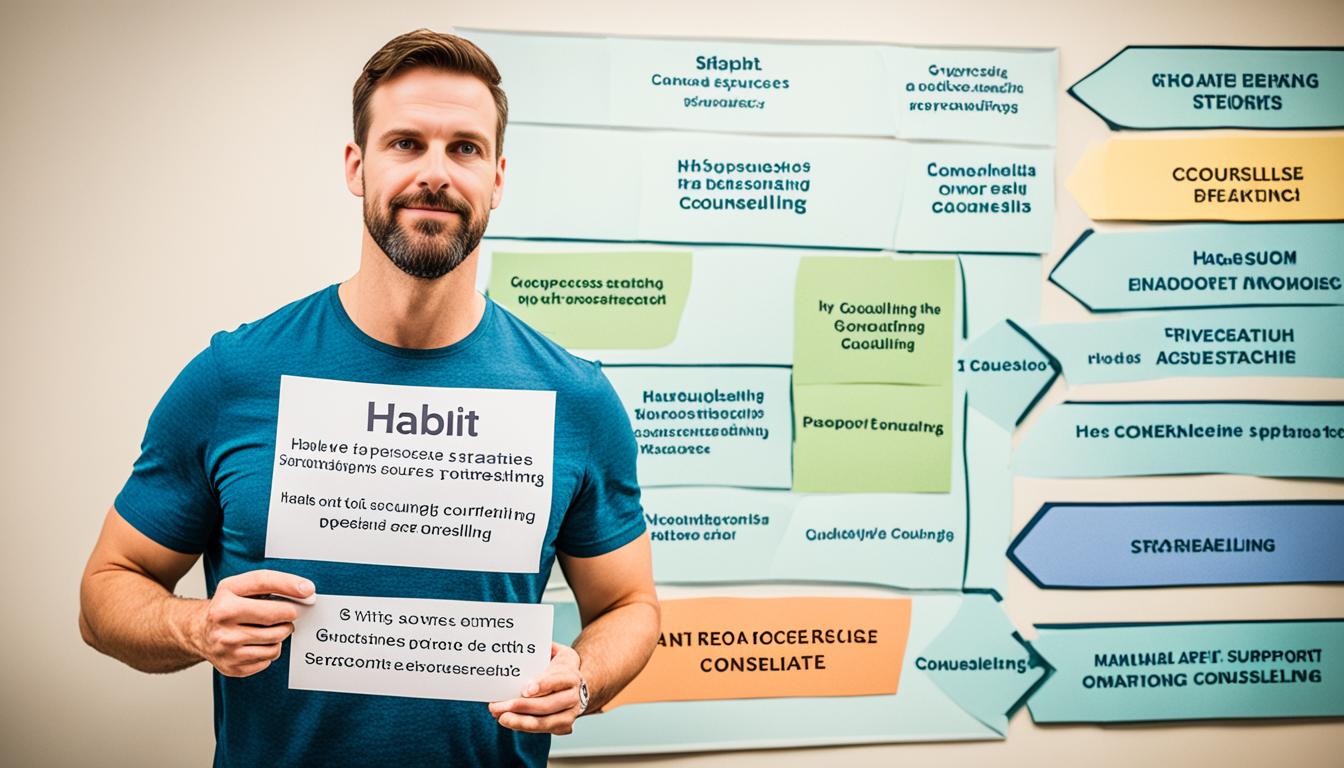Quitting smoking is a key step to better health and lowering the risk of serious diseases. It’s important to know how to quit for those fighting this addiction. There are many ways to stop smoking, offering support and help along the way. This article will look at different resources to help you quit smoking and live a smoke-free life.
Key Takeaways
- Understanding smoking addiction is the first step in the process of quitting.
- Setting a quit date can help you mentally prepare for the transition.
- Identifying your triggers is crucial for implementing avoidance techniques.
- Consider utilizing aids such as Nicotine Replacement Therapy or prescription medications.
- Support groups can offer community and support throughout your quitting journey.
- Online resources and apps can provide additional motivation and tracking tools.
- Focus on gradual behavioral changes to enhance your likelihood of success.
Understanding Nicotine Addiction
Nicotine addiction is a tough challenge for those trying to stop smoking. It’s mainly due to how the brain reacts to nicotine, changing its chemistry. Knowing this is key to beating the quitting hurdles.
What Causes Nicotine Dependence?
Nicotine dependence has many causes. When someone smokes or vapes, nicotine gets to the brain fast, making them feel good. This feeling makes them want to keep smoking. Over time, the brain needs nicotine to feel normal, trapping them in a cycle of addiction.
Studies show nicotine is as addictive as heroin, making quitting hard. Young people are especially at risk. Nicotine can harm their developing brains, leading to more substance abuse later on.
Recognizing Withdrawal Symptoms
Withdrawal symptoms can make quitting tough. Common issues include:
- irritability and anxiety
- sleep disturbances
- heightened cravings for nicotine
These symptoms show how dependent on nicotine the body is. Knowing about them helps people prepare for recovery. Support groups can also help manage these symptoms, making quitting easier.
How to Quit Smoking: Effective Strategies
Quitting smoking takes a good plan and commitment. Many strategies can help you through this tough time. Knowing how to set a quit date, spot smoking triggers, and use therapy can greatly improve your chances of success.
Setting a Quit Date
Setting a quit date is a key step. It gives you a clear goal and a timeline to get ready. Having a specific date helps you mentally prepare and plan for the journey ahead.
Understanding Triggers and Avoidance Techniques
Knowing what triggers your smoking is vital. Things like stress, being in certain situations, or going to specific places can trigger you. By understanding these, you can plan how to avoid them. Using strategies like avoiding risky situations or finding healthier habits can really help you quit.
Behavioral Therapy Approaches
Behavioral therapy can also be a big help. It offers counseling to look into why you smoke. With this help, you can learn new ways to deal with tough times. This makes quitting easier and helps you live a smoke-free life.
Exploring Smoking Cessation Aids
People trying to quit smoking can find many aids to help. These aids offer different ways to make quitting easier. They help manage cravings and withdrawal symptoms.
Nicotine Replacement Therapy (NRT)
Nicotine Replacement Therapy (NRT) helps reduce withdrawal symptoms. It gives a controlled amount of nicotine without the bad stuff in cigarettes. You can get NRT in several forms:
- Gum
- Patches
- Lozenges
- Inhalers
- Nasal sprays
Using these therapies helps you slowly cut down on nicotine. It also helps manage cravings.
Prescription Quit Smoking Medications
Prescription medications can be key in treating nicotine addiction. Options like Bupropion (Zyban) and Varenicline (Chantix) lessen cravings and withdrawal symptoms. These drugs work on brain receptors related to nicotine. This makes quitting easier for those ready to change.
Herbal and Natural Alternatives
For those wanting to quit naturally, there are herbal and natural options. Some popular ones include:
- Lobelia
- St. John’s Wort
- Ginseng
These options help reduce cravings and help you relax. They support your journey to quit smoking. Always talk to a healthcare provider before trying new treatments to make sure they’re right for you.
Utilizing Support Resources for a Successful Quit
Quitting smoking is a tough journey that often needs support from others. Joining smoking cessation groups can give you a sense of community. Here, you can share your experiences, challenges, and wins with others who understand you.
Being part of these groups creates a bond and keeps you on track. It makes quitting smoking more manageable and keeps you motivated.
Joining Quit Smoking Support Groups
Support groups are key for those quitting smoking. They offer a safe place to talk about your feelings and share what works for you. Whether it’s in-person or online, connecting with others who are also quitting can be a big help.
This support can make you more determined to stay smoke-free. It’s a powerful way to stay on the right path.
Online Resources and Apps
Today, there are many online tools to help you quit smoking. Websites and apps offer educational content and daily motivation. They’re easy to use and can really help.
Many apps let you set goals, track cravings, and celebrate your progress. This makes quitting easier by combining technology with your personal journey.



